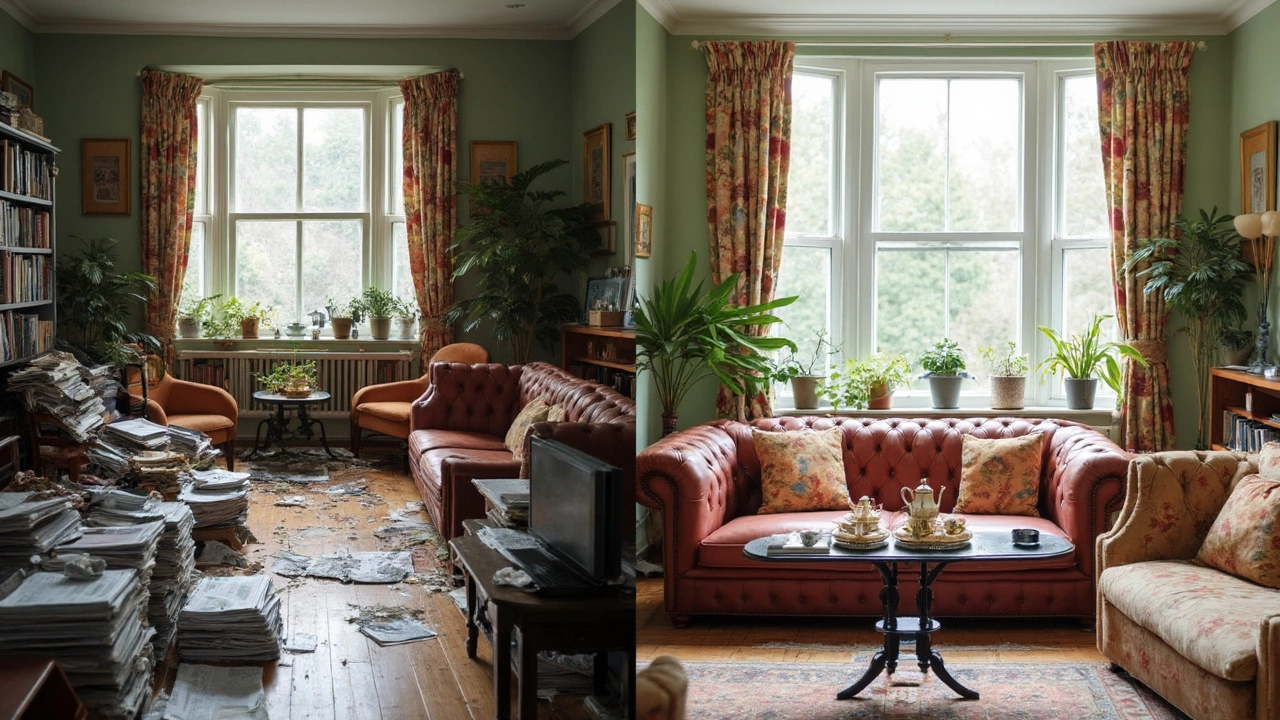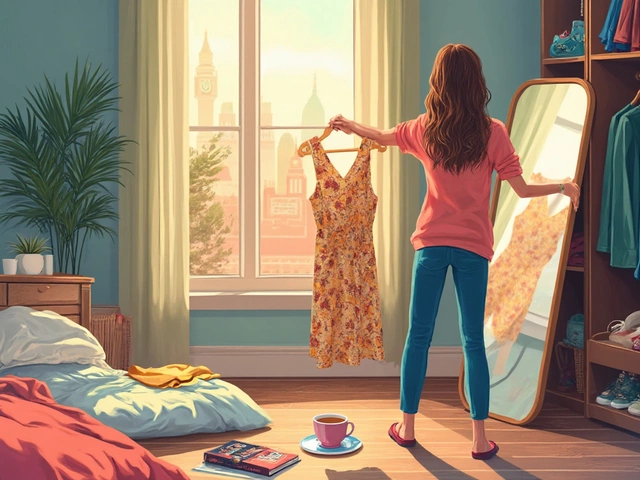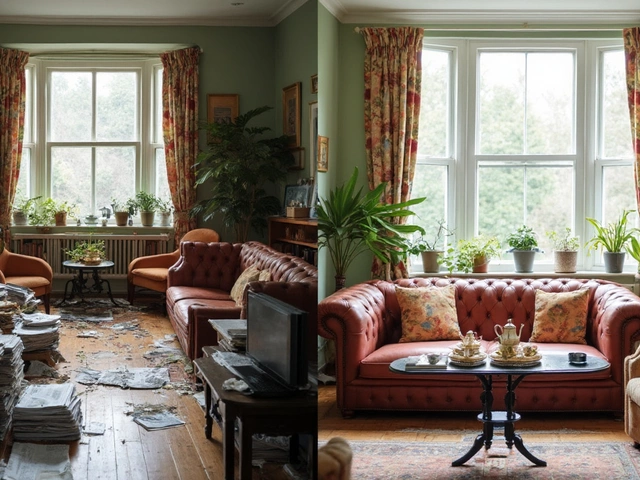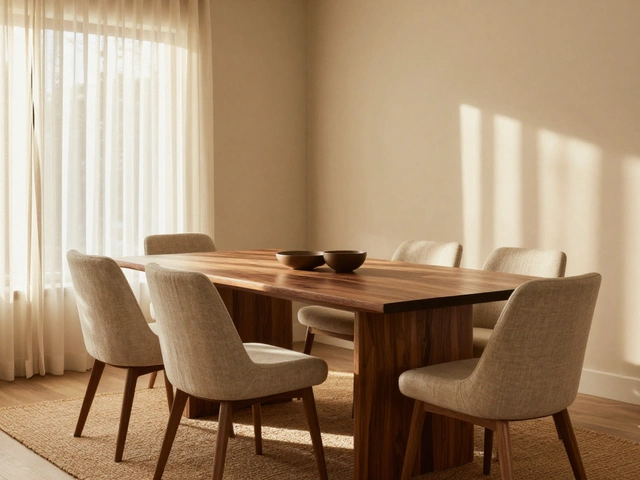Feeling overwhelmed by the sheer amount of stuff in your house? You're definitely not alone. Here's the lowdown: decluttering is more than just neatening up your space; it's a game-changer for your peace of mind. Let's dig into some no-nonsense tips to help you tackle clutter aggressively.
First off, let's get real about clutter. We accumulate things over time, from gifts to impulse buys, and before we know it, we're drowning in stuff. It doesn't have to be this way! Prep yourself with a ruthless mindset and a game plan. For starters, gather some boxes, trash bags, and determination.
Next, you'll need a sorting strategy. Go room by room or focus on categories like clothes or books. Rule of thumb: if you haven't used it in the past year, it's probably time to say goodbye. Don't let 'what ifs' clutter your judgment. Separate items into keep, donate, and trash piles.
- Understanding Clutter
- Preparing for the Declutter
- Sorting and Purging
- Organizing Cleverly
- Maintaining a Clutter-Free Home
- Mental Health Benefits of Decluttering
Understanding Clutter
Ever wonder why our homes end up so messy? Clutter doesn't just appear overnight. It sneaks up gradually, little by little. But what's crucial is understanding why it happens and how it affects us.
For a start, clutter is often linked to emotional factors. We attach sentimental value to belongings: a scarf from a friend, a set of old books you loved. While some items genuinely hold memories, others just pile up and take over your living space.
Impact of Clutter
Did you know too much clutter can spike your stress levels? It's not just about the mess; it's about the chaos it brings to mind. Studies have shown that living in a cluttered environment can lead to increased stress and anxiety. When you can't find your keys or your favorite sweater, it's not just an inconvenience—it can impact your psychological well-being.
Recognizing the Types of Clutter
- Sentimental clutter: Think of your kid’s first drawing. It's hard to let go, right?
- Informational clutter: Those random papers you swear you'll organize 'someday.'
- Convenience clutter: Products you bought hoping they'd make life easier but didn't.
Understanding these categories can help you decide what truly deserves a spot in your home. It also makes it easier to declutter and stick with your decisions.
Quick Fact: According to a study by UCLA's Center on Everyday Lives and Families, clutter in homes can actually lead to higher levels of the stress hormone cortisol.
So there you have it. Clutter isn't just about stuff; it's a genuine part of how we live and feel. But knowing this gives us power—the power to change it. In the next sections, we’ll cover how you can take this knowledge and turn it into actionable steps to achieve a clutter-free lifestyle.
Preparing for the Declutter
Diving headfirst into your decluttering mission without a game plan isn't the best idea. Let's map out a few steps to get you ready for some serious home organization. Trust me, a bit of prep work goes a long way!
Set Clear Goals
Start by clarifying what you want to achieve. Do you want a spotless living room? A more organized kitchen? Jot down concrete objectives to keep you motivated as you go.
Gather Supplies
Arm yourself with the right tools. You'll need some heavy-duty trash bags for items that need to go straight to the curb. Reusable boxes or bins are handy for things you plan to donate. Oh, and labels—lots of them!
Time to Schedule
Pick a day or block out a weekend dedicated solely to this task. Decluttering can be exhausting, so give yourself time and take breaks to avoid burning out.
Plan Your Approach
Decide whether you want to go room by room or tackle specific categories like clothes or books. This step is kinda crucial because a chaotic approach might just drive you crazy. Stick to one plan, and you'll avoid unnecessary stress.
| Household Areas | Estimated Time |
|---|---|
| Living Room | 3 hours |
| Kitchen | 4 hours |
| Bedroom | 5 hours |
Don't beat yourself up if it takes longer than you thought. These times are just estimates, and depending on your clutter level, your mileage may vary!
Get in the Right Mindset
Having the right mindset is half the battle. Be prepared to make tough choices about what stays and what goes. It's about creating a more functional space, not just making it look nice.
Once your prep is solid, you're all set to dive into the decluttering and take back control of your space!
Sorting and Purging
Alright, so now that you're all set to declutter, let's dive into the sorting and purging phase. This step is crucial to making your home feel lighter and more organized. Trust me, you’ll want to do this effectively to see actual results.
Game Plan: Room by Room
Approach it room by room, or if that's too big of a bite, focus on one category—like shoes or books. Each space should get the attention it deserves for a truly effective home organization. Remember, the goal here is to minimize, so keep a pragmatic mindset.
The Three-Pile System
As you tackle each area, you'll want to sort items into three piles: Keep, Donate, and Trash. Be honest with yourself about what you really need. It's room for treasures, not for things that gather dust.
- Keep: These are items you actually use or have significant sentimental value.
- Donate: Perfectly good items that you don't need but someone else might find useful.
- Trash: Anything broken, expired, or just plain useless should make its way here.
Don't second-guess too much. Limit your decision-making to a minute per item to keep the momentum going. Trust your gut!
Declutter-Friendly Tips
- Get a friend to help for a different perspective. Plus, they might snag some of your decluttered items.
- Consider the 'Marie Kondo' method; keep only what sparks joy!
- Set a time limit to avoid burnout. Try tackling a small space in under an hour.
Feeling hesitant about letting go? Imagine the space you'll gain and the peace of mind from not having clutter around. If it helps, take before and after pics to remind yourself why it's worth it!
Fun Fact: The Clutter Effect
Did you know that clutter can make you feel more stressed and less productive? Studies have shown that people who live in cluttered environments often have higher levels of the stress hormone cortisol. So say goodbye to things that don't add value to your life!
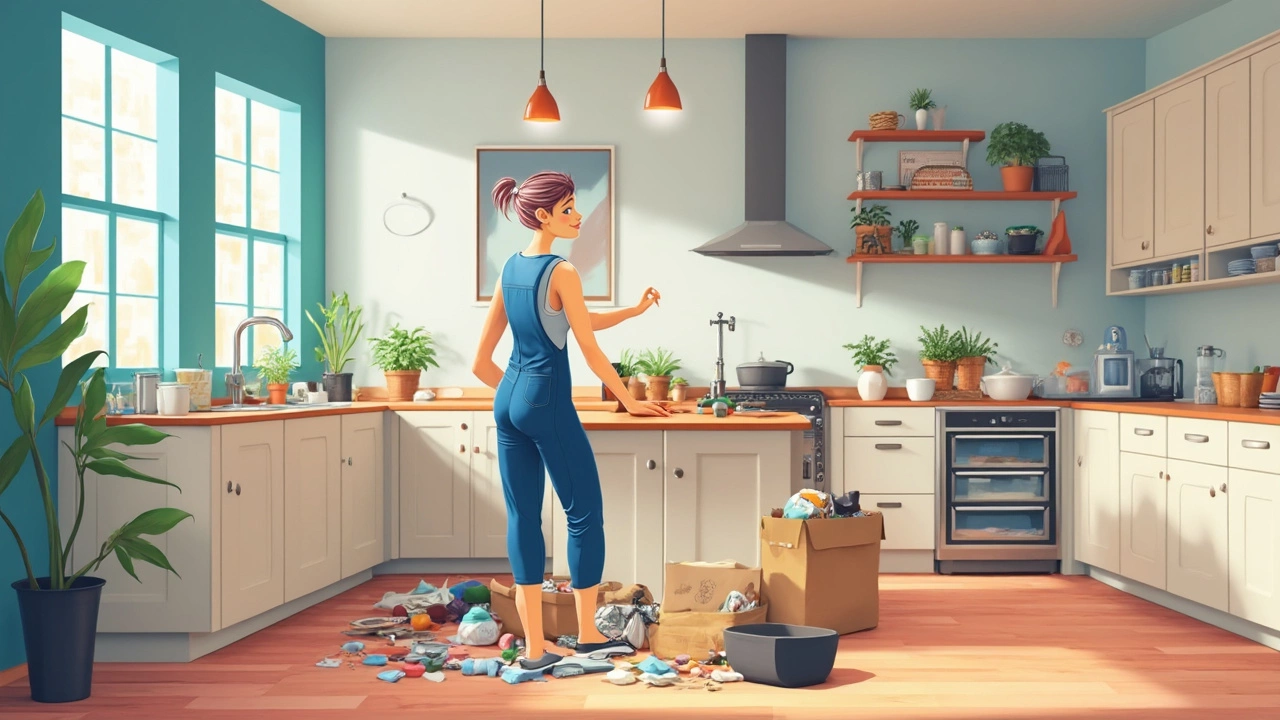
Organizing Cleverly
Alright, so you've managed to pare down your stuff, but the key to maintaining that progress is finding a system that works for you. Let's talk about some clever ways to organize your home and keep it looking fabulous without breaking the bank or your brain.
Maximize Storage Space
One common misconception is that you need more storage when, often, the right kind of storage is what matters. Consider using vertical space. Wall shelves, hanging organizers, and over-the-door racks can do wonders in any room. Look for unused spaces behind doors or under beds.
Keep Like With Like
Grouping similar items together makes finding things a breeze and returns order to your space. Think about it this way: keep all your cleaning supplies in one area, toys in another, and so on. Use clear bins or labels for easy identification.
Functional Decor
Who says storage can’t be stylish? Invest in furniture that doubles as storage, like ottomans with hidden compartments or coffee tables with shelves. It's a neat way to reduce visual clutter while keeping essentials handy.
Label Everything
If you label it, you won't lose it. Labels aren’t just for your spice rack; they're beneficial everywhere—kitchen, garage, even your closet. This simple step can make life easier for everyone in the household.
Regular Touch-ups
Set a small amount of time aside each week to tidy up. It’s much easier to maintain the system you’ve set up than to start over. Think of it like laundry—if you wait too long, it becomes daunting. Do a little bit often, and it stays manageable.
By embracing these strategies, you’ll find that living clutter-free becomes second nature. Plus, your friends will be asking for your home organization tips in no time!
Maintaining a Clutter-Free Home
Keeping your space decluttered isn't just a one-time gig; it's a lifestyle change. But don't worry—it doesn't have to be a chore forever. With some simple habits and a pinch of discipline, you can maintain a tidy home without endless effort.
Set Daily Routines
The best way to manage clutter is to prevent it from building up in the first place. Have a quick clean-up routine at the end of each day. Spend just 10-15 minutes tidying up your surroundings, returning items to their designated spots, and you'll be ahead of the curve.
Adopt a 'One in, One out' Rule
A golden rule for minimizing clutter is whenever you bring something new into your home, make sure to remove another item. This way, your possessions remain at a manageable level, and you won’t end up piling things again.
Use Storage Solutions Effectively
Invest in smart storage solutions to keep everything organized. Use clear containers so you can see what’s inside, and label them for even more convenience. Things like closet organizers and under-bed storage can make a big difference. Remember, out of sight shouldn't mean out of mind.
Schedule Regular Decluttering Sessions
Mark your calendar with a seasonal decluttering session. Four times a year, go through your stuff and decide what's staying. This ensures that you're continuously evaluating your possessions and only keeping what's truly needed.
Data-Driven Insights
According to a survey by National Association of Productivity & Organizing Professionals, homes with regular decluttering schedules report a 40% improvement in stress reduction. Living in a tidy home can boost relaxation and productivity.
| Before Decluttering | After Decluttering |
|---|---|
| High Stress Level | 40% Stress Reduction |
| 20% Free Space | 50% Free Space |
Keeping your home clutter-free is totally doable when you weave these habits into your daily routine. The peace of mind and space you'll gain makes it all worthwhile. So start today and enjoy the calm that an organized home brings.
Mental Health Benefits of Decluttering
Believe it or not, an organized home can be a major mood booster. Living in a cluttered space ties our brains into knots, making it hard to find relaxation. When you declutter, you’re not only organizing your home, but also clearing mental pathways for better focus and peace.
Here's the kicker: studies have shown that a tidy environment reduces stress levels. Clutter continually signals to our brains that there’s unfinished work, spiking anxiety. But when spaces are neat, our minds feel free. Imagine coming home to a space that whispers calm and relaxation instead of shouting stress and chaos.
Here’s Why Decluttering Matters
- Boosts Productivity: A clean environment enhances concentration and decision-making, letting you tackle tasks head-on.
- Improves Sleep: A decluttered bedroom can lead to better sleep quality by creating a serene space.
- Encourages Mindfulness: Sorting through belongings prompts you to evaluate what truly matters, fostering a mindfulness mindset.
Quick Mental Wins from Decluttering
Start small. Begin with a single drawer or closet. Even minor victories can significantly impact your mood. Over time, these small efforts lead to big changes in your mental health. Feel that sense of accomplishment? That’s a mood boost right there!
Home organization isn't just about physical tidying—it's about mental clarity. Commit to a routine where you spend even just 10 minutes a day staying on top of clutter, so anxiety doesn't have room to settle in.
Check it out:
| Task | Time Needed | Mental Benefit |
|---|---|---|
| Declutter desk | 15 minutes | Improved focus |
| Clear out closet | 30 minutes | Reduced stress |
| Organize one room | 1 hour | Increased relaxation |
Take control of your space, and you’ll find more than just a cleaner home—you’ll uncover a more peaceful, focused mind.

